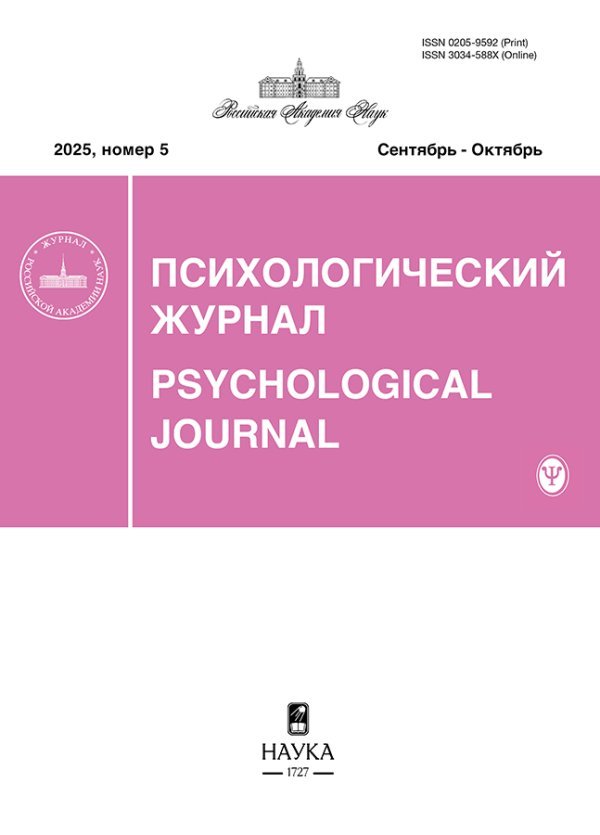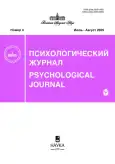Origins of B.D. Parygin’s social psychology and its prospects for understanding human being and society in the conditions of neo-structuration
- Authors: Mironenko I.A.1, Sorokin P.S.2
-
Affiliations:
- St. Petersburg State University
- National Research University “Higher School of Economics”
- Issue: Vol 46, No 4 (2025)
- Pages: 99-107
- Section: History of psycology
- URL: https://rjsvd.com/0205-9592/article/view/691069
- DOI: https://doi.org/10.31857/S0205959225040092
- ID: 691069
Cite item
Abstract
The article offers an analysis of the theoretical and methodological foundations of the scientific heritage of B.D. Parygin, on the occasion of the 95-th anniversary of his birth. It reveals the “lines of succession”, the historical and conceptual connections of Parygins’ work with the Russian tradition of social and humanitarian science, traced from the last third of the 19-th century. This is expressed, on the one hand, in the interdisciplinary nature of his approach, integrating psychological developments with sociological and philosophical ones, and, on the other hand, in a special emphasis on the creative spiritual potential of the individual, the understanding of which requires going beyond the logic of determinism from the side of the social context, recognizing the human transformative possibilities in relation to the surrounding world. These features are highly relevant in the context of contemporary challenges associated with radical changes in society, which in social theory have been generalized under the terms “morphogenetic society” and “neo-structuring”, emphasizing the dependence of the evolution of social systems not only on institutionally defined patterns, but also through individual agency, that is, the ability to transform the environment in a direction not determined by social structures. The prospects for applying Parygins’ ideas for topical discussions in the field of labor and education are shown.
About the authors
I. A. Mironenko
St. Petersburg State University
Author for correspondence.
Email: mironenko.irina1@gmail.com
199034, St. Petersburg, Universitetskaya embankment, 7-9, Russia
P. S. Sorokin
National Research University “Higher School of Economics”
Email: psorokin@hse.ru
101000, Moscow, Myasnitskaya st., 20, Russia
References
- Andreyeva G.M. K istorii stanovleniya sotsial’noy psi-khologii v Rossii. Vestn. Mock. un-ta. Ser. 14. Psikhologiya. 1997. № 4. P. 6–17. (In Russian)
- Golovey L.A., Zhuravlev A.L., Tarabrina N.V. B.G. Ananiev i mezhdistsiplinarnyye issledovaniya v psikhologii (K 110-letiyu so dnya rozhdeniya). Psikhologicheskii zhurnal. 2017. V. 38. № 5. P. 108–117. (In Russian)
- Zhuravlev A.L., Mironenko I.A. Sistema nauchnykh predstavleniy B.D. Parygina v oblasti sotsial’noy psikhologii. Psikhologicheskii zhurnal. 2012. V. 33. № 5. P. 28–38. (In Russian)
- Zhuravlev A.L., Mironenko I.A. Vklad B.D. Parygina v vozrozhdeniye otechestvennoy sotsial’noy psikhologii (k 85-letiyu so dnya rozhdeniya. Psikhologicheskii zhurnal. 2015. V. 36. № 5. P. 117–124. (In Russian)
- Mironenko I.A. Psikhologicheskiye issledovaniya v polidistsiplinarnom diskurse agentnosti: problemy i perspektivy. Voprosy obrazovaniya. 2024. № 1. P. 162–184. (In Russian)
- Mironenko I.A., Zhuravlev A.L. Empiricheskiye i prikladnyye raboty v nauchnom tvorchestve B.D. Parygina (k 90-letiyu so dnya rozhdeniya). Psikhologicheskii zhurnal. 2020. V. 41. № 4. P. 46–54. (In Russian)
- Oleynik Yu.N., Zhuravlev A.L. Nauchnyye traditsii kak mekhanizm preyemstvennosti psikhologicheskogo poznaniya. Chast’ 1. Sostoyaniye i trudnosti izucheniya. Psikhologicheskii zhurnal. 2024. V. 5. № 3. P. 5–14. (In Russian)
- Oleynik Yu.N., Zhuravlev A.L. Nauchnyye traditsii kak mekhanizm preyemstvennosti psikhologicheskogo poznaniya. Chast’ 2. Problemy, podkhody i perspektivy issledovaniya. Psikhologicheskii zhurnal. 2024. V. 45. № 4. P. 5–15. (In Russian)
- Parygin B.D. Osnovy sotsial’no-psikhologicheskoy teo- rii. Moscow: Mysl’, 1971. (In Russian)
- Parygin B.D. Sotsial’naya psikhologiya. Istoki i perspektivy. Saint Petersburg: SPbGUP, 2010. (In Russian)
- Petrovskiy A.V. Psikhologiya v Rossii: KHKH vek. Moscow: URAO, 2000.
- Rubinshteyn S.L. O filosofskoy sisteme G. Kogena. Istoriko-filosofskiy yezhegodnik’92. Moscow, 1994. P. 247–258. (In Russian)
- Sorokin P.S. Problema “agentnosti” cherez prizmu novoy real’nosti: sostoyaniye i napravleniya razvitiya. Sotsiologicheskiye issledovaniya. 2023. № 3. P. 103–114. (In Russian)
- Sorokin P.S., Mal’tseva V.A. Ot diskretnykh navykov – k tselostnomu sozidatel’nomu chelovecheskomu potentsialu: novyy podkhod v teorii i praktike. Forsayt. 2024. V. 18. № 1. P. 6–17. (In Russian)
- Sorokin P.S., Mironenko I.A. Problema proaktivnosti lichnosti vo vzaimodeystvii so sredoy v sovremennom mezhdunarodnom diskurse. Psikhologicheskii zhurnal. 2022. V. 43. № 4. P. 90–100. (In Russian)
- Fligstein N., Macadam D. Teoriya poley. Trans. from Eng. E.B. Golovlyanitsynoy. Moscow: VSHE, 2022. (In Russian)
- Shavrovskaya M.N., Pogudina K.A. Chelovekotsentrichnaya organizatsiya: osnovnyye cherty i primery yeye razvitiya. Motivatsiya i oplata truda. 2024. №. 1. P. 40–45. (In Russian)
- Archer M.S. Can Complexity add anything to Critical Realism and the Morphogenetic Approach? Journal for the Theory of Social Behaviour. 2024. V. 54. №. 4. P. 422–433.
- Bromley P., Meyer J.W. Hyper-management: Neoliberal expansions of purpose and leadership. Organization Theory. 2021. V. 2. № 3. doi: 10.1177/26317877211020327.
- Cavazzoni F., Fiorini A., Veronese G. How do we assess how agentic we are? A literature review of existing instruments to evaluate and measure individuals’ agency. Social Indicators Research. 2022. V. 159. №. 3. P. 1125–1153.
- Fletcher A., Benveniste M. Narrative Creativity: An Introduction to How and Why. Series: Elements in Creativity and Imagination. Cambridge: Cambridge University Press, 2025.
- Harré H.R. Social Being: A Theory for a Social Psychology. Oxford: Blackwell, 1979.
- Klich J. Human enhancement technologies and healthcare policy. London: Taylor & Francis, 2024.
- Lim W.M. The workforce revolution: Reimagining work, workers, and workplaces for the future. Global Business and Organizational Excellence. 2023. V. 42. № 4. P. 5–10.
- Nichols L.T. Integralism and positive psychology: A comparison of Sorokin and Seligman. Catholic Social Science Review. 2005. № 10. P. 21–40.
- Sorokin P.S. The Russian Sociological Tradition from the 19-th Century Until the Present: Key Features and Possible Value for Current Discussions. The American Sociologist. 2015. V. 46. № 3. P. 341–355.
- Sorokin P.S. The Promise of John W. Meyer’s World Society Theory: “Otherhood” through the Prism of Pitirim A. Sorokin’s Integralism. The American Sociologist. 2020. V. 51. № 4. P. 506–525.
- Stetsenko A. Radical-Transformative Agency: Continuities and Contrasts with Relational Agency and Implications for Education. Frontiers Education. 2019. V. 4. № 148. P. 1–13
- Wood A.J., Lehdonvirta V. Antagonism beyond employment: How the ‘subordinated agency’of labour platforms generates conflict in the remote gig economy. Socio-Economic Review. 2021. V. 19. № 4. P. 1369–1396.
- Zhuravlev A.L., Mironenko I.A., Sorokin P.S. Boris Parygin’ Social Psychology: History and Perspectives. Journ. of the History of Behavioral Sciences. V. 61. № 1 (Winter 2025). e70006. doi: 10.1002/jhbs.70006.
Supplementary files











